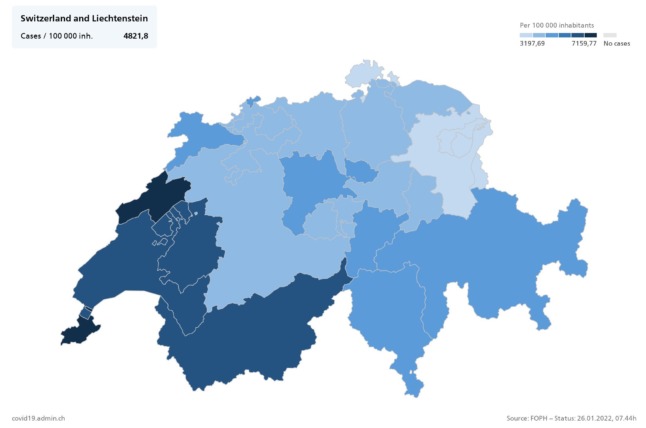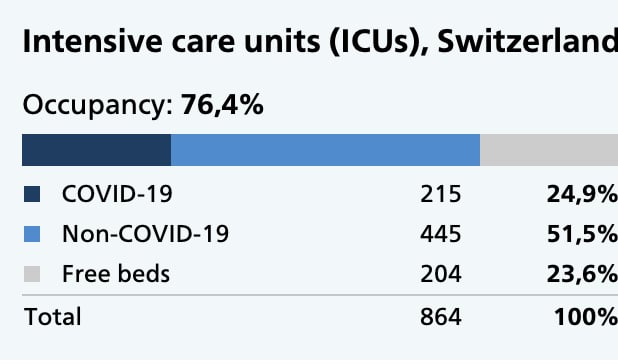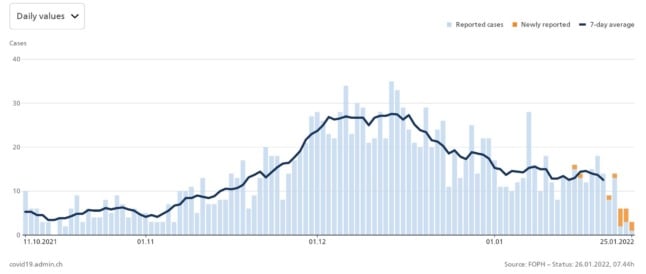'Too early to celebrate': How Omicron is still holding Switzerland in its grip

Although epidemiologists believe the pandemic in Switzerland has likely reached its peak, the number of Covid cases continues to climb.
On Wednesday, Switzerland reached a new record in terms of coronavirus cases: 43,199 new infections were reported. There are now 4,821.80 contaminations per 100,000 people — the highest number ever recorded.
“The increase is exponential”, said Urs Karrer, vice-president of the Covid-19 Task Force.
And even though Virginie Masserey, head of the infection control unit at the Federal Department of Public Health (FOPH) said “we can be reasonably optimistic”, others, like Patrick Mathys, FOPH’s chief of crisis management warned that “it is too early to celebrate” pandemic’s end, as Omicron continues to spread rapidly across the country.
Where are the current Covid hotspots?
While in the fall most pockets of infections were found in the eastern and central parts of Switzerland, they have since migrated west, now affecting mostly French-speaking cantons.
Geneva has the highest rate (7,159.77 / 100,000), followed by Neuchâtel (6,568.16). Vaud, Fribourg, and Valais also exceed the national average for the number of declared cases.

Image: FOPH
READ MORE: Covid: One in ten Swiss infected in past week
On the other hand, there is some positive news regarding hospitalisations: the number of Covid patients admitted to intensive care units has been stable and even dropping “due to the growing immunity of the population and the lower virulence of Omicron”, according to Karrer.
As at January 25, 215 ICU beds are occupied by coronavirus patients — 32 less than the previous week.

Image: FOPH
Virtually all patients admitted to Swiss healthcare facilities have contracted the more virulent Delta variant which, though less prevalent than Omicron, is still spreading in Switzerland among the unvaccinated.
As in previous weeks, the vast majority of patients are unvaccinated.

Image: FOPH
The number of deaths is also dropping due to vaccinations, according to FOPH.

Image: FOPH
What do health experts say about the possible evolution of the epidemiological situation?
A number of health officials believe that pandemic is winding down.
Marcel Tanner, an epidemiologist at University of Basel, said that the situation should stabilise in the summer and generalised rules such face masks and the Covid certificate mandate will no longer be necessary “if we continue to get vaccinated and get booster doses”.
Other experts also say that with more people contracting Omicron, the level of immunity is growing within the population, signalling the pandemic’s end.
READ MORE: Covid-19: What will summer 2022 look like in Switzerland?
However, a new development to contend with on the epidemiological front is the recent appearance of the Omicron sub-variant, the so-called BA.2.
This sub-type is already present in Switzerland, although still rare, as opposed to the main Omicron variant, which now accounts for nearly 94 percent of all Covid cases.
“This makes Omicron even more mysterious. To date, we cannot explain this atypical development”, said Richard Neher, who researches viruses at University of Basel.
A return to square one of the global health crisis is unlikely, Neher said, but “it is too early to speak of an endemic situation as the proportion of unimmunised people is still too high in Switzerland.
And it can’t be excluded that Omicron evolves again — producing more mutations — or that a variant like Delta regains strength, Neher pointed out.
Comments (1)
See Also
On Wednesday, Switzerland reached a new record in terms of coronavirus cases: 43,199 new infections were reported. There are now 4,821.80 contaminations per 100,000 people — the highest number ever recorded.
“The increase is exponential”, said Urs Karrer, vice-president of the Covid-19 Task Force.
And even though Virginie Masserey, head of the infection control unit at the Federal Department of Public Health (FOPH) said “we can be reasonably optimistic”, others, like Patrick Mathys, FOPH’s chief of crisis management warned that “it is too early to celebrate” pandemic’s end, as Omicron continues to spread rapidly across the country.
Where are the current Covid hotspots?
While in the fall most pockets of infections were found in the eastern and central parts of Switzerland, they have since migrated west, now affecting mostly French-speaking cantons.
Geneva has the highest rate (7,159.77 / 100,000), followed by Neuchâtel (6,568.16). Vaud, Fribourg, and Valais also exceed the national average for the number of declared cases.

Image: FOPH
READ MORE: Covid: One in ten Swiss infected in past week
On the other hand, there is some positive news regarding hospitalisations: the number of Covid patients admitted to intensive care units has been stable and even dropping “due to the growing immunity of the population and the lower virulence of Omicron”, according to Karrer.
As at January 25, 215 ICU beds are occupied by coronavirus patients — 32 less than the previous week.

Image: FOPH
Virtually all patients admitted to Swiss healthcare facilities have contracted the more virulent Delta variant which, though less prevalent than Omicron, is still spreading in Switzerland among the unvaccinated.
As in previous weeks, the vast majority of patients are unvaccinated.

Image: FOPH
The number of deaths is also dropping due to vaccinations, according to FOPH.

Image: FOPH
What do health experts say about the possible evolution of the epidemiological situation?
A number of health officials believe that pandemic is winding down.
Marcel Tanner, an epidemiologist at University of Basel, said that the situation should stabilise in the summer and generalised rules such face masks and the Covid certificate mandate will no longer be necessary “if we continue to get vaccinated and get booster doses”.
Other experts also say that with more people contracting Omicron, the level of immunity is growing within the population, signalling the pandemic’s end.
READ MORE: Covid-19: What will summer 2022 look like in Switzerland?
However, a new development to contend with on the epidemiological front is the recent appearance of the Omicron sub-variant, the so-called BA.2.
This sub-type is already present in Switzerland, although still rare, as opposed to the main Omicron variant, which now accounts for nearly 94 percent of all Covid cases.
“This makes Omicron even more mysterious. To date, we cannot explain this atypical development”, said Richard Neher, who researches viruses at University of Basel.
A return to square one of the global health crisis is unlikely, Neher said, but “it is too early to speak of an endemic situation as the proportion of unimmunised people is still too high in Switzerland.
And it can’t be excluded that Omicron evolves again — producing more mutations — or that a variant like Delta regains strength, Neher pointed out.
Join the conversation in our comments section below. Share your own views and experience and if you have a question or suggestion for our journalists then email us at [email protected].
Please keep comments civil, constructive and on topic – and make sure to read our terms of use before getting involved.
Please log in here to leave a comment.